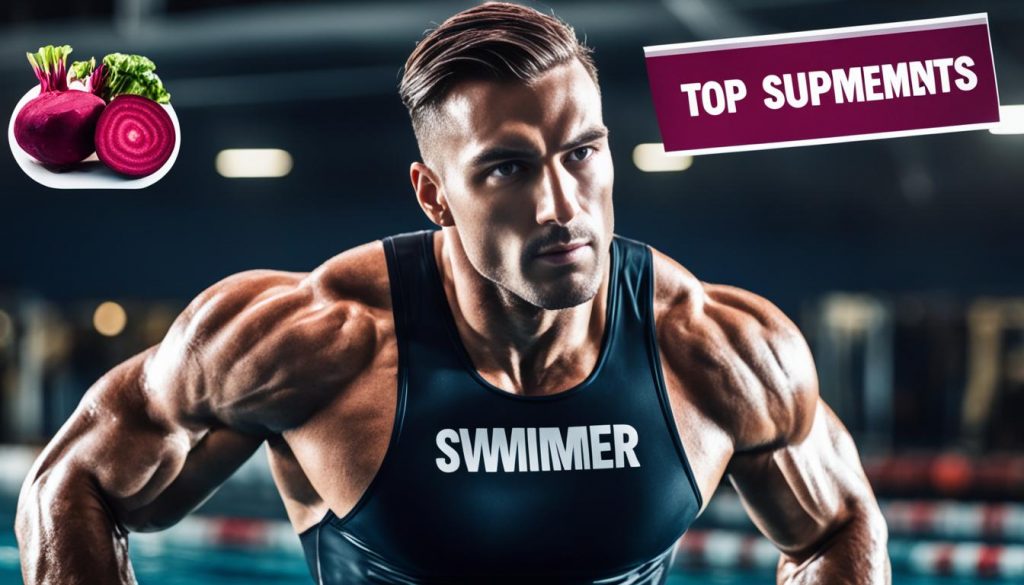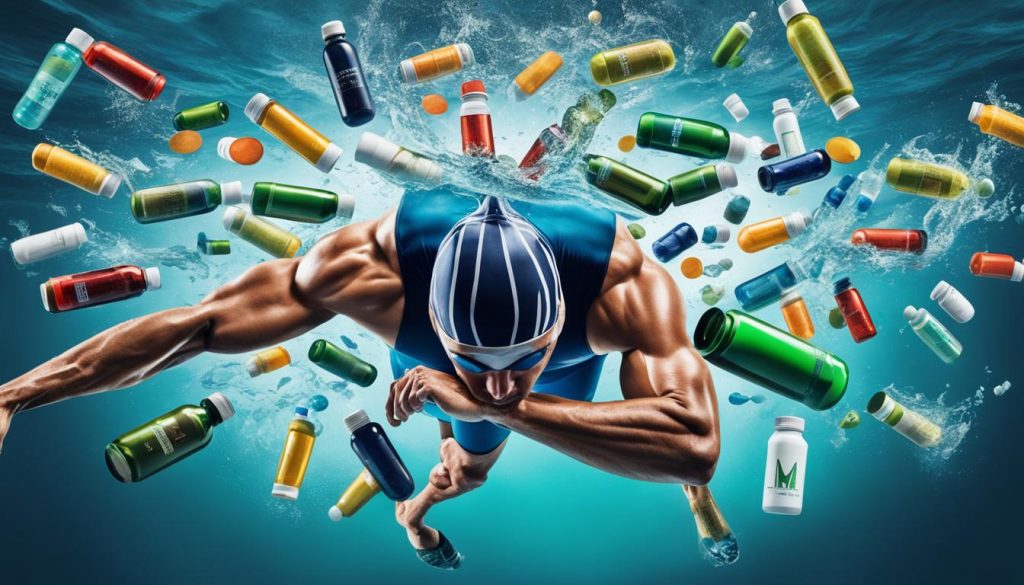The performance of swimmers can be greatly influenced by their nutrition. A well-balanced diet is crucial, but supplementary nutrients can give the additional help required to maximize their capability in the water. This article will look into the top supplements for swimmers and how they can boost their fitness level and performance.
It is important to note that supplements should never replace whole food sources, as they cannot provide the same range of nutrients. However, when used in combination with a healthy diet, supplements can help fill in nutritional gaps and support swimmers in their training and recovery.
Key Takeaways:
- Supplements can enhance swimmers’ nutrition and support their performance.
- Choose supplements that complement a balanced diet rather than replace it.
- Consult with a healthcare professional or dietitian before starting any supplement regimen.
- Focus on supplements that target hydration, energy, muscle strength, and overall recovery.
- Remember that everyone’s needs are different, so personalized advice is crucial.
The Benefits of Electrolyte Supplements for Swimmers
Electrolyte supplements play a crucial role in optimizing swimmers’ performance by helping them maintain hydration levels and preventing muscle cramps. These supplements are particularly beneficial for swimmers who sweat excessively during their workouts. By providing essential minerals like magnesium, potassium, sodium, and chloride, electrolyte supplements help regulate fluid balance, support muscle function, and ensure proper nerve reactions within the body.
When swimmers engage in intense training sessions, they lose significant amounts of electrolytes through sweat. Replenishing these electrolytes is essential to prevent dehydration, muscle cramps, and potential performance decline. The best supplements for swimmers are those that offer a balanced combination of essential minerals, specifically tailored to meet the unique needs of swimmers.
To fully understand the benefits of electrolyte supplements for swimmers, let’s take a closer look at the key minerals they contain:
- Magnesium: Supports muscle function and relaxation, aids in energy production, and contributes to electrolyte balance.
- Potassium: Helps maintain proper cellular function, balances fluids, and supports muscle contractions.
- Sodium: Plays a crucial role in fluid balance, nerve function, and muscle contractions.
- Chloride: Helps maintain proper hydration, regulates pH balance, and supports digestion.
By supplementing with electrolytes, swimmers can ensure optimal hydration, enhance muscle performance, and improve overall endurance in the water. Electrolyte supplements can be consumed before, during, or after swimming sessions, depending on individual needs and preferences.
Proper hydration is vital for swimmers, and the best supplements for swimmers are those that provide the right balance of electrolytes to support their performance and recovery.
The Power of Creatine for Swimmers
In the world of swimming, where speed, strength, and endurance are paramount, athletes are constantly seeking ways to enhance their performance in the water. One supplement that has gained popularity among swimmers is creatine.
Creatine is a naturally occurring compound in the body that plays a crucial role in providing energy for short bursts of intense activity, such as swimming. It is primarily stored in the muscles and released during high-intensity exercises, fueling rapid and powerful movements.
Swimmers can benefit greatly from taking creatine supplements as part of their training routine. Here are some key advantages:
1. Increased muscle strength: Creatine supplementation has been shown to enhance muscle strength and power, enabling swimmers to generate more force during their strokes. This can lead to improved speed and efficiency in the water.
2. Improved muscle recovery: Swimming is a demanding sport that puts significant strain on the muscles. Creatine helps facilitate muscle recovery by replenishing energy stores and reducing muscle damage, allowing swimmers to bounce back faster between training sessions.
3. Enhanced overall performance: By increasing both muscle strength and recovery, creatine can have a positive impact on a swimmer’s overall performance. It allows athletes to push harder, swim faster, and achieve new personal bests.
Creatine supplements can be taken at various times throughout a swimmer’s training regimen, depending on individual preferences and goals:
- Pre-workout: Taking creatine before a training session can prime the muscles and provide an extra burst of energy, enabling swimmers to perform at their best.
- Intra-workout: Some swimmers choose to consume creatine during their workouts to maintain muscle energy levels, especially during long and intense sessions.
- Post-workout: Taking creatine after a swim can aid in muscle recovery and replenishment, helping swimmers bounce back faster and prepare for the next training session.
It’s important to note that while creatine supplements can be highly effective for many swimmers, it’s always best to consult with a healthcare professional or sports nutritionist before starting any new supplementation regimen. They can help determine the most suitable dosage and guide swimmers on how to incorporate creatine into their overall nutrition plan.
In conclusion, creatine supplements offer swimmers a powerful tool to enhance their performance in the pool. With its ability to increase muscle strength, improve muscle recovery, and boost overall performance, creatine has become a go-to supplement for many competitive swimmers.
Enhancing Endurance with Beetroot
When it comes to enhancing endurance in swimmers, one powerful supplement that has gained significant attention is beetroot. Packed with essential vitamins, minerals, antioxidants, and nitrates, beetroot can provide swimmers with the extra edge they need to excel in the pool.
The nitrates found in beetroot are converted into nitric oxide in the body, leading to an increase in blood flow and oxygen delivery to the muscles. This enhanced blood flow can improve performance by boosting endurance, intensity, and overall athletic ability.
Additionally, the high antioxidant content in beetroot helps reduce exercise-induced oxidative stress, minimizing muscle damage and inflammation. This can result in faster recovery times, allowing swimmers to bounce back quickly and continue performing at their best.
Beetroot’s rich nutrient profile and performance-enhancing benefits make it an excellent choice for swimmers looking to improve their endurance and overall performance in the water.
To incorporate beetroot into their diet, swimmers can opt for concentrated forms such as beet juice or beet powder. These convenient options provide a concentrated dose of nitrates and other beneficial compounds found in beetroot.
Here is a table summarizing the key benefits of beetroot for swimmers:
| Benefits of Beetroot for Swimmers |
|---|
| Improved endurance |
| Increased blood flow and oxygen delivery to muscles |
| Enhanced athletic performance |
| Reduced exercise-induced muscle damage and inflammation |
| Quicker recovery times |
Swimmers can enjoy the benefits of beetroot by adding it to their pre-workout smoothies, incorporating it into post-workout recovery meals, or even consuming it in juice form for a quick boost of nutrients.

The Effects of Caffeine on Swimming Performance
When it comes to improving athletic performance, caffeine has proven to be a valuable supplement for swimmers. Caffeine has been shown to increase mental alertness and delay fatigue during endurance exercise, making it an ideal choice for swimmers looking to enhance their performance in the pool.
Swimmers can benefit from taking caffeine supplements before their workouts to experience the positive effects on their athletic performance. Caffeine acts as a stimulant, helping swimmers stay focused, alert, and energized throughout their training sessions. By reducing the perception of fatigue, caffeine can help swimmers push harder and maintain a higher intensity during their swims.
However, it’s important to note that caffeine sensitivity can vary among individuals. Some swimmers may experience a greater boost in performance, while others may not respond as effectively. It’s recommended that swimmers carefully monitor their caffeine intake to avoid excessive consumption, which can lead to negative side effects such as restlessness, anxiety, and disrupted sleep patterns.
Benefits of Caffeine for Swimmers:
- Increased mental alertness
- Delayed fatigue
- Improved focus and concentration
- Enhanced endurance during training
Incorporating caffeine supplements into a swimmer’s nutrition plan can provide a competitive edge and help them achieve their performance goals. However, it’s essential to consult with a healthcare professional or a sports nutritionist before starting any supplement regimen to ensure it aligns with individual needs and goals.
“Caffeine has been proven to enhance endurance performance by reducing the perception of fatigue and improving focus and concentration.” – Dr. Michael Stevens, Sports Nutritionist
| Caffeine Intake | Effect on Performance |
|---|---|
| Modest consumption (3-6 mg/kg) | Improved endurance and reduced perception of effort |
| Higher consumption (>9 mg/kg) | Increased risk of negative side effects such as restlessness and anxiety |
The Importance of Vitamin D for Swimmers
Vitamin D is a vital nutrient that plays a crucial role in the overall health and performance of swimmers. It is essential for various functions in the body, including:
- Bone Strength: Vitamin D helps in the absorption of calcium and phosphorus, which are essential for maintaining strong and healthy bones.
- Energy Boost: Sufficient levels of vitamin D can contribute to increased energy levels, helping swimmers perform at their best in the pool.
- Immune System Support: Vitamin D has been linked to a healthy immune system and may help swimmers ward off illnesses and infections.
- Muscle Function: Adequate vitamin D levels are necessary for optimal muscle function and coordination, aiding in performance and preventing injuries.
- Mood Improvement: Vitamin D has been associated with improved mood and overall mental well-being, promoting a positive mindset during training and competitions.
Swimmers who primarily practice indoors or live in areas with limited sunlight exposure may be at a higher risk of vitamin D deficiency. Supplementing with vitamin D can help ensure swimmers maintain optimal levels of this essential nutrient, supporting their overall health and enhancing performance in the pool.

Quote:
“Vitamin D is a critical component of swimmer nutrition, playing a significant role in bone health, energy levels, and immune system support. Supplementing with vitamin D can help swimmers reach their full potential in the water.”
The Benefits of Omega-3 for Swimmers
Omega-3 fatty acids are essential for swimmers looking to enhance their performance and support their overall health. These important nutrients, which are found in fish oil supplements, offer a range of benefits to swimmers.
First and foremost, omega-3 fatty acids are known for their positive impact on heart health. They can help reduce the risk of cardiovascular diseases and improve overall cardiovascular function, allowing swimmers to maintain their endurance and stamina in the water.
Additionally, omega-3 fatty acids support brain function, aiding in cognitive performance and mental focus while swimming. This can help swimmers stay attentive and make quick decisions during races or training sessions.
The benefits of omega-3 extend beyond the pool as well. These fatty acids promote healthy skin, contributing to a swimmer’s overall well-being and appearance. They also have anti-inflammatory properties, which can help reduce exercise-induced inflammation and promote faster recovery.
Swimmers who do not regularly consume fish in their diet may struggle to obtain adequate amounts of omega-3 fatty acids. In such cases, supplementing with fish oil capsules can be a convenient and effective solution to ensure they receive these essential nutrients.
Furthermore, studies have suggested that omega-3 supplements may have a positive impact on mood and mental health. By improving serotonin levels and reducing the risk of depression, omega-3 can contribute to a swimmer’s overall happiness and well-being.
Overall, incorporating omega-3 supplements into a swimmer’s nutrition plan can be highly beneficial for performance, recovery, and overall health. It is recommended to consult with a healthcare professional or a registered dietitian to determine the appropriate dosage and ensure it aligns with individual needs and goals.
| Food | Omega-3 Content (per 100g) |
|---|---|
| Salmon | 2.1g |
| Mackerel | 2.6g |
| Sardines | 1.5g |
| Flaxseeds | 22.8g |
| Chia Seeds | 17.8g |
The Role of Iron in Swimmer’s Performance
Iron plays a crucial role in the performance and overall health of swimmers. It helps prevent muscle damage and inflammation, and is essential for carrying oxygen to the muscles. This mineral is particularly important for female swimmers, as they are at a higher risk of iron deficiency due to menstruation. Monitoring iron levels and considering supplementation can be beneficial for swimmers looking to optimize their performance.
When it comes to choosing iron supplements, it is important to select forms that are less constipating and more absorbable. This ensures that the body can efficiently utilize the iron and reap its benefits. Consulting with a healthcare professional or registered dietitian can help determine the appropriate iron supplementation and dosage for swimmers.
Iron is important for swimmers as it helps prevent muscle damage and inflammation, and plays a vital role in carrying oxygen to the muscles.
Here are some iron-rich foods that swimmers can incorporate into their diet:
- Lean red meat
- Poultry
- Seafood
- Beans and legumes
- Dark leafy greens
- Nuts and seeds
- Fortified cereals and breads
By including these iron-rich foods in their meals, swimmers can naturally boost their iron intake and support their performance in the pool.
Iron-rich Foods for Swimmers
| Food | Iron Content (per 100g) |
|---|---|
| Lean Red Meat (Beef) | 3.4mg |
| Chicken Breast | 0.9mg |
| Tuna | 1.0mg |
| Black Beans | 3.6mg |
| Spinach | 2.7mg |
| Almonds | 3.7mg |
| Oatmeal (Fortified) | 4.7mg |
Swimmers should prioritize their nutrition and ensure they are meeting their iron needs through a well-balanced diet. Incorporating iron-rich foods and considering iron supplementation, if necessary, can help swimmers maintain optimal iron levels and support their performance in the pool.
The Benefits of Magnesium for Swimmers
Magnesium is a vital mineral that plays a crucial role in the overall health and performance of swimmers. It is involved in various essential functions within the body, including bone health, heart health, muscle function, nerve function, mental health, and sleep quality.
Swimmers often have increased magnesium requirements due to the high physical demands they place on their bodies during training and competitions. However, many swimmers may not consume enough magnesium through their diet alone, making supplementation an excellent option to ensure optimal levels of this essential mineral.
One notable benefit of magnesium supplementation for swimmers is its ability to improve sleep quality. Quality sleep is crucial for muscular recovery and overall performance. By taking magnesium supplements at night, swimmers can promote better sleep patterns and support the body’s recovery processes, enabling them to perform at their best in the pool.
Moreover, magnesium is involved in muscle contraction and relaxation, making it particularly important for swimmers who depend on efficient muscle function for their performance. Supplementing with magnesium can help prevent muscle cramps and spasms, optimizing muscular performance during training sessions and competitions.
In addition to its effects on physical performance, magnesium also plays a role in supporting mental health. It has been shown to help reduce anxiety and improve mood, allowing swimmers to maintain a positive mindset and focus during their training and races.
“Magnesium supplementation can enhance sleep quality, support muscle function, and improve mental health for swimmers.”
To fully harness the benefits of magnesium, swimmers should consider taking magnesium supplements in consultation with a healthcare professional or a registered dietitian. They can provide guidance on the appropriate dosage and form of magnesium supplementation that is most suitable for each individual swimmer’s needs.
By incorporating magnesium supplementation into their swimmer nutrition plans, swimmers can support their overall health, enhance muscular performance and recovery, and optimize their performance in the water.
Pre and Post-Swim Supplements for Swimmers
When it comes to maximizing performance in the pool, swimmers can benefit from incorporating specific supplements into their pre and post-swim routine. These supplements can provide the necessary nutrients to fuel workouts, boost energy levels, enhance endurance, and support muscle recovery.
Before Swimming: Fueling Energy
To give your swim a powerful start, consider these supplements:
- Instant Oats: A quick and easily digestible source of carbohydrates, instant oats provide sustained energy for your swim.
- Caffeine: Known for its ability to improve performance, caffeine can increase focus, endurance, and alertness in the water.
- Creatine: This supplement helps increase muscle strength and power, allowing swimmers to generate more force in each stroke.
During Swimming: Quick Energy and Hydration
Stay energized and hydrated in the pool with the following supplements:
- Maltodextrin Powder: A high-glycemic carbohydrate source, maltodextrin powder provides quick energy during intense swimming sessions.
- Electrolyte Powder: Swimmers who sweat heavily can benefit from replenishing electrolytes like magnesium, potassium, sodium, and chloride to maintain hydration and prevent muscle cramps.
After Swimming: Muscle Recovery and Replenishment
Support your body’s recovery process with these supplements:
- Protein Bars: A convenient and delicious source of protein, protein bars help repair and rebuild muscles after intense workouts.
- Recovery Blends: These specialized supplements typically contain a mix of carbohydrates, protein, and other nutrients to enhance muscle recovery, reduce inflammation, and replenish energy stores.
By incorporating these pre and post-swim supplements into your training routine, you can optimize your performance and support your body’s nutritional needs. It’s important to consult with a healthcare professional or dietitian before starting any supplement regimen to ensure they align with your individual goals and health requirements.
Conclusion
Optimizing performance and supporting overall health are key goals for swimmers. By incorporating the best supplements for swimmers into their training and diet, swimmers can unlock their full potential in the water.
Electrolyte supplements, such as those containing magnesium, potassium, sodium, and chloride, can help maintain hydration levels and prevent muscle cramps during intensive workouts. Creatine supplements provide a valuable energy source for short bursts of intense activity, enhancing muscle strength, recovery, and performance in the pool.
Supplements like beetroot, caffeine, and omega-3 can further enhance endurance, improve intensity, and support recovery. Vitamin D and iron play important roles in bone health, muscle function, and carrying oxygen to the muscles. And magnesium, known for its benefits in sleep quality and nerve function, aids swimmers in rest and recovery.
It is important to consult with a healthcare professional or dietitian before incorporating any supplements into your regimen. They can help guide you in choosing the right products and dosage for your individual needs. Remember, supplements should be used to complement a well-rounded diet and training program, not replace them.
FAQ
Are supplements a replacement for whole food sources?
No, supplements can be beneficial, but they cannot replace the nutritional benefits of whole food sources.
How can electrolyte supplements help swimmers?
Electrolyte supplements can help swimmers maintain hydration levels, prevent muscle cramps, regulate fluid balance, maintain muscle function, and ensure proper nerve reactions in the body.
What are the benefits of creatine for swimmers?
Creatine supplements can increase muscle strength, improve muscle recovery, and enhance overall performance in the water.
How can beetroot enhance a swimmer’s performance?
Beetroot is rich in vitamins, minerals, antioxidants, and nitrates, which can increase blood flow, enhance endurance, improve intensity, and shorten recovery time for swimmers.
Can caffeine supplements benefit swimmers?
Yes, caffeine supplements can increase mental alertness and delay fatigue during endurance exercise, thus improving a swimmer’s performance. However, individual caffeine sensitivity should be considered.
Why is vitamin D important for swimmers?
Vitamin D is essential for bone strength, energy boost, immune system support, muscle function, and mood improvement for swimmers.
How can omega-3 supplements benefit swimmers?
Omega-3 fatty acids found in fish oil supplements can improve heart health, brain function, skin health, decrease inflammation, support cognitive function, and improve mood for swimmers.
Why is iron important for swimmers?
Iron helps prevent muscle damage and inflammation, and plays a vital role in carrying oxygen to the muscles of swimmers. Female swimmers, in particular, are at a higher risk of iron deficiency due to menstruation.
How can magnesium supplements benefit swimmers?
Magnesium is important for bone health, heart health, muscle function, nerve function, mental health, and sleep quality for swimmers. Many swimmers do not consume enough magnesium through their diet, making supplementation a good option.
What are some recommended pre and post-swim supplements for swimmers?
Swimmers can benefit from supplements like instant oats for energy, caffeine for improved performance, creatine for increased muscle strength before swimming, maltodextrin powder for quick energy, electrolyte powder for hydration replenishment during swimming, and protein bars, and recovery blends for muscle recovery and replenishment after swimming.



